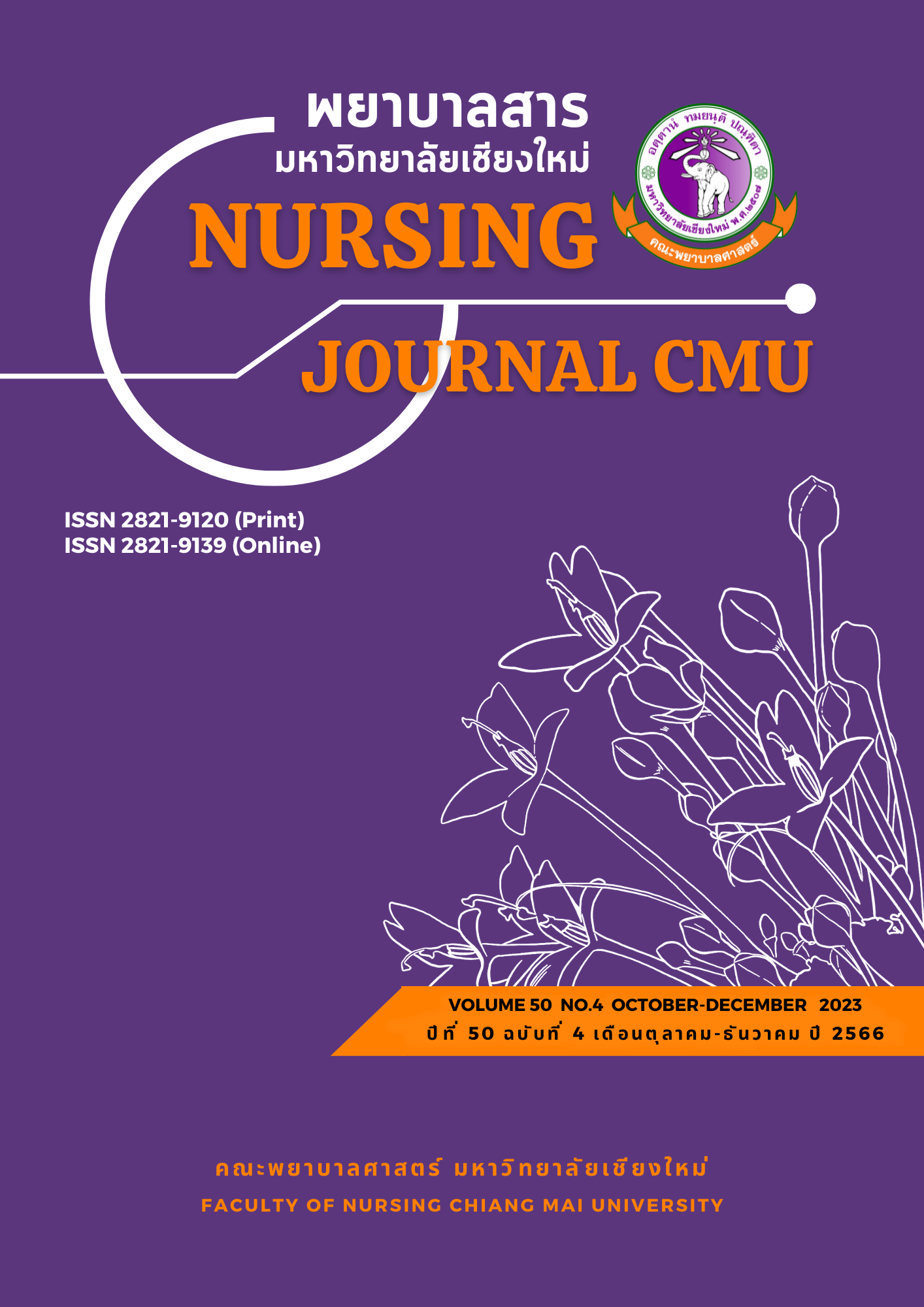Interventions to Promote Sexual Function Among Acute Myocardial Infarction Patients after Percutaneous Coronary Intervention: A Systematic Review
Keywords:
Sexual function, Acute myocardial infarction, Percutaneous coronary interventionAbstract
Sexual dysfunction is a common problem after acute myocardial infarction. It often remains unaddressed at discharge and affects people’s quality of life. Therefore, it is important to promote sexual function in patients with myocardial infarction. The purpose of this systematic review was to review the knowledge on sexual function promotion interventions in patients with acute myocardial infarction (AMI) after percutaneous coronary intervention (PCI) using the Joanna Briggs Institute Systematic Review Guideline. This review was based on studies retrieved from electronic databases, including PubMed, THAIJO, CINAHL, ProQuest, EBSCO, Wiley Online, Science Direct, and Cochrane Library, done between 2013-2023. The main terms “sexual function”, “promoting interventions”, and “acute myocardial infarction” were found in 310 studies. The retrieved studies were appraised and selected using the tools developed by the Joanna Briggs Institute. Six studies met the review inclusion criteria (4 RCTs and 2 quasi-experimental studies). The studies included in the review varied in terms of their intervention’s timing, methods, and evaluation outcomes, Therefore, the results were summarized in narrative form to describe the intervention characteristics and determine the intervention outcomes.
The results of this systematic review revealed that:
1. Four Interventions for promoting sexual function among AMI patients after PCI were found: 1) sex education; 2) counseling; 3) exercise to improve capacity, strength, and endurance of the pelvic floor; and 4) use of social media.
2. Regarding intervention outcomes, the results showed that they improved 1) sexual health, including sexual function, sexual behavior, and resumption of sexual activity shortly after AMI; 2) physical health outcomes, including improvement of exercise capacity and enhanced strength and endurance of pelvic floor; and 3) emotional outcomes, including reduction of fear about intercourse, decreased anxiety, depression and stress, and improvement of sexual satisfaction.
The results of this systematic review can guide clinical practice in promoting sexual function among AMI patients especially using combined interventions for each individual patient. Study of the interventions is recommended for further research.
References
Boonrueang, P., & Ua-kit, N. (2020) Selected factors associated with sexual function amongpatients with myocardial infarction after percutaneous transluminal coronary intervention.Royal Thai Navy Medical Journal, 47(1), 140-157. (in Thai)
Farajkhoda, T., Memar, F. Z., Khanabadi, M., & Sarebanhassanabadi, M. (2022). Effectiveness of online versus telephone counseling of rational-emotional-behavioral therapy on sexual function of women undergoing cardiac rehabilitation: A randomized clinical trial. Galen Medical Journal, 11, e2396. https://doi.org/10.31661/gmj.v11i.2396
Lemasawat, K. (2021). Update acute and chronic coronary syndrome. In W. Yoodee, M. Nimworapun, P. Arunmanakul, & S. Chinwong (Eds.), Excellent pharmacy practice in cardiovascular disease (1st ed., pp. 49-74). Faculty of Pharmacy, Chiang Mai University. (in Thai)
Lindau, S. T., Abramsohn, E., Bueno, H., D'Onofrio, G., Lichtman, J. H., Lorenze, N. P., Sanghani, R. M., Spatz, E. S., Spertus, J. A., Strait, K. M., Wroblewski, K., Zhou, S., & Krumholz, H. M. (2016). Sexual activity and function in the year after an acute myocardial infarction (AMI) among younger women and men in the United States and Spain. JAMA Cardiology, 1(7), 754-764.
Ngamvilai, S. (2010). Outcomes of the self-efficacy enhancement program on sexual behavior of patients with coronary artery disease at Banpong Hospital in Ratchaburi Province [Master thesis, Christian University]. Christian University Library. https://library.christian.ac.th/thesis
Palm, P., Zwisler, A. D. O., Svendsen, J. H., Thygesen, L. C., Giraldi, A., Jensen, K. G., Lindschou, J., Winkel, P., Gluud, C., Steinke, E., & Berg, S. K. (2019). Sexual rehabilitation for cardiac patients with erectile dysfunction: A randomised clinical trial. Heart, 105(10), 775-782. https://doi.org/10.1136/heartjnl-2018-313778
Phomdontre, T., & Damkliang, J. (2021). Risk factors of acute myocardial infarction in young adults: An integrative literature review. Songklanagarind Journal of Nursing, 41(3), 99-108. (in Thai)
Popradab, T., Saneha, C., Sriprasong, S., & Chantadansuwan, T. (2023) Factors influencing sexual function among male patients with acute coronary syndrome post percutaneous coronary intervention. Nursing Science Journal of Thailand, 41(2), 33-45. (in Thai)
Smith, A. B., Barton, D. L., Davis, M., Jackson, E. A., Smith, J., & Wittmann, D. (2022). A preliminarystudy of short-term sexual function and satisfaction among men post-myocardial infarction. Journal of Holistic Nursing, 40(3), 208-218.
Soroush, A., Komasi, S., Heydarpour, B., Ezzati, P., & Saeidi, M. (2018). The effectiveness of psychosexual education program on psychological dimensions of sexual function and its quality in cardiac rehabilitation patients. Research in Cardiovascular Medicine, 7(2), 82-86.
The Joanna Briggs. (2020). Critical appraisal checklist for randomized controlled trials. https://jbi.global/critical-appraisal-tools
Tirgari, B., Rafati, F., & Rabori, R. M. (2019). Effect of sexual rehabilitation program on anxiety, stress, depression and sexual function among men with coronary artery disease. Journal of Sex & Marital Therapy, 45(7), 632-642.
Xiao, L., Wang, P., Fang, Q., & Zhao, Q. (2018). Health-promoting lifestyle in patients after percutaneous coronary intervention. Korean Circulation Journal, 48(6), 507-515.
Xu, F., Ming, Q., & Hou, L. (2015). The effect of sex counselling in the sexual activity of acute myocardial infarction patients after primary percutaneous coronary intervention. Acta Cardiologica, 70(4), 460-464.
Downloads
Published
How to Cite
Issue
Section
License
Copyright (c) 2023 Nursing Journal

This work is licensed under a Creative Commons Attribution-NonCommercial-NoDerivatives 4.0 International License.
บทความที่ได้รับการตีพิมพ์เป็นลิขสิทธิ์ของวารสารพยาบาลสาร
ข้อความที่ปรากฏในบทความแต่ละเรื่องในวารสารวิชาการเล่มนี้เป็นความคิดเห็นส่วนตัวของผู้เขียนแต่ละท่านไม่เกี่ยวข้องกับมหาวิทยาลัยเชียงใหม่ และคณาจารย์ท่านอื่นๆในมหาวิทยาลัยฯ แต่อย่างใด ความรับผิดชอบองค์ประกอบทั้งหมดของบทความแต่ละเรื่องเป็นของผู้เขียนแต่ละท่าน หากมีความผิดพลาดใด ๆ ผู้เขียนแต่ละท่านจะรับผิดชอบบทความของตนเองแต่ผู้เดียว






